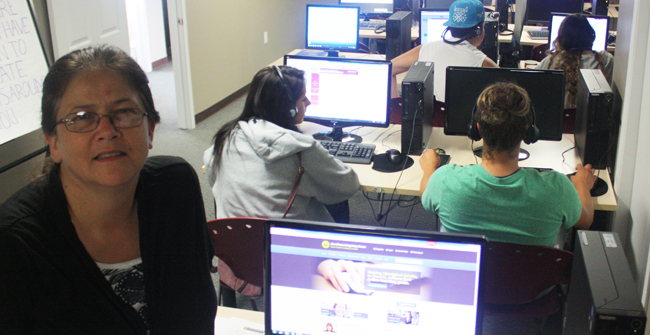Job readiness program helps youth make decisions

By Heather Campbell
GARDEN RIVER FIRST NATION – For several young people this past summer were offered the opportunity to develop job readiness skills through online learning.
Garden River’s Aboriginal Skills and Employment Training Strategy, and the Niigaaniin Program partnered with Contact North | Contact Nord, Ontario’s distance education network, to provide a four-week training program that included online courses and employment coaching.
Hali Solomon, manager for the Niigaaniin Program says it works well because they don’t need to have several different people come into the community to deliver the training. The individual training was actually delivered by instructors with the Sioux Hudson Literacy Council, one of Contact North’s educational partners. The participants were connected through the virtual classroom accessed from the computers located in their refurbished bingo hall.
“We are targeting youth between the ages of 18 to 24 years old. They don’t always know what they want to do whether working or choosing an educational path,” says Solomon.
Through the federal government’s First Nations Job Fund they have been able to invest in their young people to enter the workforce. The government has dedicated $109 million to the First Nations Job Fund between 2013 and 2017 for job training programs. Solomon says they have over 40 young people who could potentially participate in this program.
Sioux-Hudson Literacy Council is a community-based, client-centred group that operates the Sioux Lookout Learning Centre, the Hudson Learning Centre and Good Learning Anywhere eChannel distance delivery program. The job readiness program includes exploring career options, resume building and interview skills.
“It is important to have these programs here in the community,” says Wanita Jones, acting job development coordinator. “With no public transportation many will avoid pursuing their goals.”
Ensuring that all the resources are available in the community, including one-on-one coaching for mapping out realistic pathways is seeing some success. The first step has been to address barriers such as upgrading and completing a high school diploma. Transportation to a city centre that offers those opportunities can be the biggest barrier to overcome. Bringing the online classroom to the community has eliminated that barrier.
Cherise Johns, 19, is part of the second group and said that she doesn’t mind online learning. “The teacher walks us through step by step,” she explains. “We can ask her anything.”
Johns would like to get working and if she can stay in the community while she finishes her high school diploma then she’s comfortable using online learning.
“I want to finish high school and have some options,” she said.
There are 18 computer workstations, educational resources and mentorship for the young people to reach their career and job goals.
Tina Reed, director of partnerships for Contact North, says that they have partnered with a number of First Nation communities across the north such as Constance Lake First Nation, Ginoogaming First Nation and Attawapiskat First Nation to offer the job readiness program. They currently have online learning centres in 27 First Nations communities and continue to develop more online learning centres to address the need for accessible education.
For more information: www.contactnorth.ca

